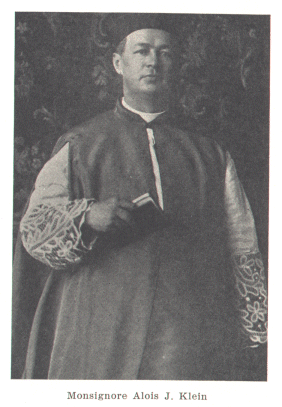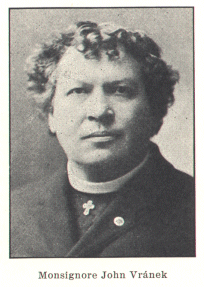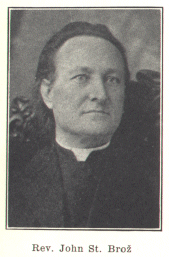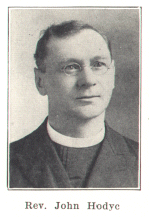 |
Priests Who Have Achieved Distinction |
This is a NEGenWeb Project web page
and is presented as part of the
MARDOS Memorial Library Collection.
Priests Who Have Achieved Distinction
|
Monsignore Alois J. Klein is now the oldest Czech priest in Nebraska, and has resided in one parish longer than any other. When the number of congregations and lodges he has organized and the buildings he has helped erect is considered, he has been more active than any of his colleagues. His long years of loyal and manifold service, his linguistic and literary accomplishments and his kindly attitude toward those who differ with him, have won for him esteem.  Monsignore Klein was born in the village of Frantoly, near Prachatice, Bohemia, on February 6, 1866, and acquired a public school education in both places. He then attended the gymnasia in Budejovice for eight years, being first in his class and graduating with honors. In 1886 he enrolled in the clerical seminary there and devoted one year to a special study of theology and the Hebraic and Arabic languages. Immediately thereafter he matriculated in the Prague University (Department of Theology), occupying his spare moments with the study of French and English. While studying in Prague, he determined to devote his life to missionary work in America, and in 1888 set out for Klagenfurt, (Celovec) Carinthia, where he completed his studies and was ordained June 15, 1889. He arrived in Nebraska October 31, 1889, and was appointed rector of St. Wenceslaus Church in Wahoo, where he was instrumental in building a fine church. On December 10, 1891, he was transferred to Crete, where he restored confidence and extricated the congregation from embarassing financial and other difficulties, caused by the dissension between the former rector and the bishop. On September 5, 1893, he arrived in Brainard, as first resident priest, and established a rectory. Weston formed a part of his precinct until 1901 and he was instrumental in enlarging the church building there (1891), adding five lots to the church site, increasing the membership from 32 to 140 families, completing the organization of the congregation and founding three sodalities. In 1895 he visited his native land and upon his return organized branches of the Catholic Workman in Brainard, Weston, Dwight, Touhy and Loma. He held services in a public school building in Dwight until the church was built, and while in Bruno, built a rectory in 1901. In Dwight he furnished and improved the church structure, founded a number of societies, added one acre of land to the cemetery, enlarged the church site, purchased a rectory and erected a large hall. In 1909 he founded a mission in Bee, where he saw a church built in 1910. In Loma a congregation sprang from the branch of the Catholic Workman and a church was built in 1911. In his own parish, Brainard, the church, when he took charge, was a mere unplastered shell and the congregation numbered 28 members. He first organized several societies and a hall was built for their use in 1902. He then built a stately church, which is one of the notable church buildings in Nebraska, also a school and rectory, as described in the history of his parish. As to his literary work, he has written under various pseudonyms: Ladislav Jurgevic, Ivan Vodicky, N. J. Elk, Michal Ivanov, Alois Zlatopotocky and others. Probably his first work in this country appeared in the monthly Kvety Americke, as shown in the chapter on publications. He has translated Washington Irving's "Alhambra", Charles Lambs's "Five Tales From Shakespeare" and some of Thomas Moore's poems from English, and Dr. Karl May's novel "In the Pacific Ocean" from German, the latter having been published in 1901 by the publishers of Hlas in St. Louis, Mo. He was contributor to the Otto Encyclopedia, a monumental Bohemian educational work of 28 volumes, and a collection of his poems (in Bohemian) under the title "From The Domain Of The Prairie" is prepared for publication. He has contributed articles on bee-keeping to the Rural Beekeeper, Beekeeper's Review, The American Bee Journal and Annual Reports of the Nebraska State Board of Agriculture for 1911 and 1913. Since 1911 he has served three terms as president of the Nebraska State Beekeepers' Association. In recognition of his services to his church, in 1898, he was selected as member of the Board of Diocesean Consultors and Synodal Examiner of the Junior Clergy. In 1909, the twentieth anniversary of his ordination, Bishop Bonacum made him Vicar General. In 1911, upon the death of Bishop Bonacum he was appointed administrator of the Lincoln diocese by the Dubuque Metropolitan. For five months he directed the affairs of the church. When Bishop Tihen (successor to Bishop Bonacum) left to assume charge of the See of Denver, in 1917, the Apostolic Delegate in Washington again named Msgre. Klein administrator until Bishop O'Reilly was invested with the office. The new Bishop also named him Vicar-General, as had Bishop Tihen, placed him on the Bishop's Council, the Diocesean Building Committee and named him Parish Priest Consultor. On August 26, 1913, Pope Pius X made him domestic prelate with the title of Monsignore, the first Czech priest in Nebraska to hold that title. The investure was solemnized November 19, 1913, and June 16, 1914, Monsignore Klein celebrated the silver jubilee of his sacerdotal life. He holds also a title from his native land, for he is Honorary Canon of St. Maurice's Collegiate Chapter at Kromeriz in Moravia. This title he received from Dr. Ant. C. Stojan, the Archbishop of Olomouc, Moravia. 
Monsignore John Vranek was born April 11, 1863, in Lzin near Sobeslav, studied in Jindrichuv Hradec and was ordained in Chur, Switzerland, July 14, 1889. He came to Nebraska in April, 1890, and his first charge was that of assistant to Rev. Thomas Walsh in Norfolk, from where he took care of twelve missions, preaching in Bohemian in Verdigre, Pierce, Ravenna and Schoolcraft (near Madison). On October 23, 1890, he was made resident priest in Creighton, where he furnished the church and built a rectory. In Verdigre he remodelled the church in 1891 and organized a congregation in Pierce and Bloomfield, where he built the first church. In 1892 he began the organization of a congregation and the building of a church in Osmond, but on January 8, 1893, he was called to Omaha, to take charge of the St. Wenceslaus church, where he remained to the day of his death, November 14, 1925, almost thirty-three years. He was instrumental in the purchase of a building site for the church in South Omaha in 1893 and in that year built a brick church in Dodge costing $4,800.00 and one in Howell costing $3,000.00. In July, 1891, he was named Bishop's Consultor and Synodal Examiner and on January 4, 1925, was invested with the title of Monsignore. He wrote a large number of poems, many of which were published in the Almanac Katolik and Catholic newspapers. A collection of these, under the title "On American Soil", was published by the Bohemian Benedictine Press, Chicago, in 1905. Their theme is love of his native country and of the Catholic faith. Mr. Thos. Capek in his book "Our America" considers him the most gifted of the Bohemian priests-poets in the United States. On June 23, 1914, he celebrated the silver jubilee of his priesthood, for which purpose the Czech Bishop Koudelka came from Wisconsin, to participate. He established a number of Catholic societies and from 1896 to 1905 was chaplain of the Prvni Ustredni Jednota; in 1923 was elected protector and honorary Chaplain of the Catholic Sokols. 
Rev. John Stephen Broz was born December 25, 1865, in Kardasova Recice, County of Tabor, Bohemia. He studied four years in his birthplace, later in the gymnasia in Jindrichuv Hradec, where he graduated. With his friend John Vranek he entered the University of Styria, in Gratz, for at that time it was almost impossible to gain entrance to a seminary in Bohemia, when the applicant had no influential friends. In the Styrian seminary Emanuel A. Bouska also was a student and the three became fast friends. Inasmuch as the German element prevailed, conditions became unpleasant and the three students asked leave to attend the university in Chur, Switzerland. Rev. John Hodyc, who also came to Nebraska, entered there too the following year. All four were ordained July 14, 1889, and all came to Nebraska, as did also another student from Chur, Rev. Joseph Koutek. Rev. Broz arrived in Chadron, Nebraska, May 1, 1890, to assist Rev. J. Brophy. The territory comprised Sioux, Dawes, Box Butte and Sheridan counties, with faculties in northern Wyoming. Rev. Broz was to look after the Czechs, Poles and Germans. The country was sparsely settled and there were no churches, for the drouth meant no crops and disappointed settlers. Northwest of Chadron was a good-sized Czech colony, but it became almost extinct after 1890. In Box Butte County were two large colonies, one west of Hemingford and one east, but both have become almost depopulated of Czechs. There was also a small German mission on the Niobrara River in Box Butte County, numbering twelve families but having no church. In Sheridan County he served in a public school house, fifteen miles north of Rushville. Twelve miles south were Czech and Polish families, these he served also in a schoolhouse. East of the Niobrara Valley was a Dutch and German colony, the people living in dugouts. He had to conduct services out in the open, on account of the flies and mosquitos, an old rocking chair serving for a pulpit. In northern Sioux County, near the South Dakota boundary, lived a number of Germans who had come from Wisconsin. There they had taken their church apart, brought the material to Nebraska and rebuilt it again. This settlement was named Montrose. Rev. Broz served mass several times in Fort Robinson and met with Indians while at Gordon. His work was entirely of a missionary kind, as it was impossible to effect any organization under the circumstances. At the close of 1890 Rev. Broz was made rector in St. Paul, Howard County, a Czech-Polish-German-Irish parish, from where he took care of Warsaw, six miles west, the Czech parish Geranium (Netolice) and the Polish parish Bolesczyn in Howard County. Once a month he went to Ravenna, then a mixed parish. In 1894 he was made rector in Dodge, from where he took care of Howell and where he built the first Catholic school in the state in which Czech is taught as a part of the course. On June 24, 1914, he celebrated the silver jubilee of his priesthood, Bishop Koudelka of Wisconsin participating. From Dodge he was transferred to Schuyler, then to South Omaha, where he died Sep. 2, 1919. His latter years were years of physical suffering, tuberculosis of the bone in his leg necessitating nine operations. His poetic and literary ability was a higher-than average order, his themes being not entirely ecclesiastical. His published works are as follows --1909, by the Bohemian Benedictine Press, Chicago, History of the Bohemian Catholic parish of St. Vaclav in Dodge County; 1913, by Hlas, St. Louis, Mo., From The Prairie (poems); 1915, the same publisher: Bohemian John (poems); no date, the same publisher: The Antiquity of Man in America. He had prepared for publication (work was in fact begun with the printing) a larger work, which he called "Nebraska In The Past", but this has not as yet seen the light of day. Besides this, he was an authority on skeletal remains of the aborigines and geology in Nebraska, and a member of the Nebraska State Historical Society. 
Rev. John Hodyc, an unusually gifted poet, though no volume of his work has been published, was born in Lochenice near Kralove Hradec, January 17, 1863, and ordained in Chur, Switzerland, July 14, 1889. He came to Nebraska in that year, first being assistant to Rev. Coka in Omaha, from where he took care of Heun, Dodge, Tabor and Ravenna. In 1890 he was made incumbent in Dodge and in 1894 transferred to Grand Island, from where he took care of Ravenna. He was then transferred to South Omaha, where he built the church (costing $3,000). From South Omaha he went to Milwaukee, to Chicago and then to Boerne, Texas, where he died in August, 1906, of tuberculosis. His poems "Ambrose's Daughter", "The Peasant's Home" and "Exiles" appeared in the leading literary magazine of Bohemia, Zlata Praha, others, in United States publications, were printed in the Catholic papers Narod and Hlas and almanac Katolik. Rev. Vaclav Kocarnik wrote articles and translated stories published in the almanac Katolik and in 1911 therein published his "Reminiscences of Nebraska". Rev. Francis Zalud wrote articles for the Hlas and Ceska Zena, published in St. Louis. John Klein, not a churchman, brother of Monsignore Klein, now living in Cheyenne County, Nebraska, wrote poems. "A Dream At Sea" and "Etelka" were published in the first Kvety Americke. He was born in 1860, in Frantoly, Bohemia, and came to this country in 1881. In Nebraska: Administrator of diocese sede vacanti: Vilem Coka and Alois J. Klein. Monsignore: Alois J. Klein and John Vranek. Vicar-General: Vilem Coka, Alois J. Klein and Joseph Macourek. Bishop's Consultor: Vilem Coka, Alois J. Klein, John Vranek, Matej Bor and Joseph Macourek. Parish Priest Consultor: Alois J. Klein. Synodal Examiner: Alois J. Klein, John Vranek and Joseph Macourek. Prosynodal Examiner: J. Chundelak, John St. Broz and Francis Zalud. Dean: Charles Z. Petlach. In Europe: Canon and Consistory Consultor of the Diocese of Olomouc, Moravia, Czechoslovakia: Alois J. Klein. |
| Back | Table of Contents | Next |